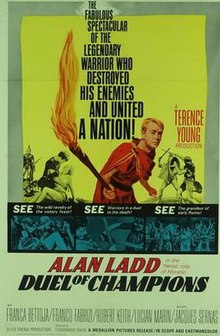Duel of Champions
| Duel of Champions | |
|---|---|
 | |
| Directed by | Ferdinando Baldi Terence Young |
| Written by | Carlo Lizzani Ennio De Concini Giuliano Montaldo |
| Story by | Luciano Vincenzoni |
| Produced by | Dominico Fazzari |
| Starring | Alan Ladd |
| Cinematography | Amerigo Gengarelli |
| Edited by | Renzo Lucidi |
| Music by | Angelo Francesco Lavagnino |
Production companies | Lovcen Film Lux Film Tiberia Film |
| Distributed by | Lux Film |
Release date |
|
Running time | 90 minutes |
| Countries | Italy Yugoslavia |
| Languages | Italian English |
Duel of Champions (Italian: Orazi e Curiazi) is a 1961 film about the Roman legend of the Horatii, triplet brothers from Rome who fought a duel against the Curiatii, triplet brothers from Alba Longa in order to determine the outcome of a war between their two nations.
This film was directed by Ferdinando Baldi and Terence Young. The screenplay was written by Ennio De Concini, Carlo Lizzani, Giuliano Montaldo and Luciano Vincenzoni. It was shot at the Cinecittà Studios in Rome.
Plot
[edit]During the period prior to the unification of Alba and Rome, the legendary Roman hero Horatius leads his troops against the forces of Alba in the region of Tullus Hostilius. He is wounded and taken prisoner but escapes and hides in the hills.
The king of Rome, believing Horatio to have been a coward, announces the engagement of his daughter Marcia to Horatio's brother Marcus, whom he names his heir.
Both Alba and Rome are anxious to find a peace. After consulting an oracle, the two kings decide that three brothers from each side should compete in a fight to the death, the winning side to dominate in the unification of the two kingdoms.
Horatio comes back to Rome, but finding his name dishonored and Marcia married, he returns to the hills.
On the day of the contest, however, he comes to fight alongside his two brothers. Both are killed. Horatio continues the fight alone and kills the three Alban brothers, including Curiazio, who was the lover of Horatio's sister, Horatia. She stabs herself to death. Horatio is now free to marry Marcia.
Cast
[edit]- Alan Ladd as Horatius
- Franca Bettoia as Marcia
- Franco Fabrizi as Curiatius
- Robert Keith as Tullus Hostilius
- Jacqueline Derval as Horatia
- Luciano Marin as Eli
- Andrea Aureli as Gaius Cluilius
- Mino Doro as Caius
- Osvaldo Ruggieri as Warrior of Alba
- Jacques Sernas as Marcus
Production
[edit]Tiberia Films had to cooperate with Lux Film in order to finance the venture.[1] Lux were making a number of movies aimed at the international market around this time, others including The Tartars, The Thief of Bagdad, and The Wonders of Aladdin.[2]
The film was originally called Horatio and was also known as Ojario and The Gladiator of Rome. Shooting took place in Yugoslavia and Rome.[2][3] Ladd walked off the set after 11 weeks of filming because he had not been paid. When his salary was guaranteed he resumed filming. "My advice to any American actor making a film abroad is to develop his own foreign policy beforehand", said Ladd. "My own, for the future, will be 'Speak softly, but carry an iron contract'."[4]
Bibliography
[edit]- Hughes, Howard (2011). Cinema Italiano – The Complete Guide From Classics To Cult. London – New York: I.B.Tauris. ISBN 978-1-84885-608-0.
See also
[edit]References
[edit]- ^ Hughes, p.55
- ^ a b Archer, Eugene (26 Apr 1961). "2 FILM SPECTACLES SLATED BY ITALIAN: Head of Lux to Do 'Pontius Pilate' and 'Sign of Cross'". New York Times. p. 32.
- ^ Hopper, Hedda (Feb 16, 1961). "Entertainment: Bryan Foy Returns to Warner Brothers Will Produce Drama of Marines; Julie London to Sing in D.C.". Los Angeles Times. p. B12.
- ^ Scheuer, Philip K. (Mar 31, 1961). "More TV Notables Grabbed for Films: Ladd Among Us for 'Tiger'; Should Nation Honor Artists?". Los Angeles Times. p. B7.
External links
[edit]- 1961 films
- Films set in ancient Rome
- Films based on classical mythology
- Films set in Italy
- Peplum films
- Films directed by Ferdinando Baldi
- Films directed by Terence Young
- 1960s Italian-language films
- English-language Italian films
- Films set in the 7th century BC
- Lux Film films
- Italian historical films
- 1960s historical films
- Films scored by Angelo Francesco Lavagnino
- Sword and sandal films
- Films shot at Cinecittà Studios
- Films with screenplays by Luciano Vincenzoni
- 1960s Italian films
